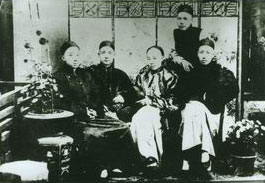Yang Heling

Group photo of the “Four Bandits” in 1892, Yang Heling, Sun Yat-sen, Chen Shaobai and You Lie from left
Yang Heling (1868~1934) was from Cuiheng Village, and graduated from Guangzhou Mathematical Academy. Around 1890, he often gathered secretly, exchanged revolutionary thoughts and discussed revolutionary plans at “Yangyaoji” (the store run by his father) in Hong Kong with Sun Yat-sen, Chen Shaobai, You Lie, etc., and they were called the “Four Bandits”. Accordingly, the Yangyaoji Store was also known as the initial political club of revolutionists. In 1892, Sun Yat-sen borrowed money from Kiang Wu Hospital in Macao to run a pharmacy, and the guarantor was Yang’s brother-in-law, Macao merchant Wu Jiewei. But Sun Yat-sent was pushed aside in Macao.Later Sun Yat-sen went to Guangzhou and Shiqi in Zhongshan to run a pharmacy, but did not have much money. As recalled by Yang’s son Yang Guokeng, Yang sold off a house on Rua Central in Macao to Wu Jiewei, and donated the money fully to Sun Yat-sen for Sun’s business development. When Sun Yat-sen initiated anti-Qing uprisings, Yang helped raise funds and make publicity in Hong Kong and Macao, and once served at China Daily – a revolutionary newspaper run by Chen Shaobai. After the foundation of Republican China, Yang lived in seclusion in Macao, and called his residence the “Four Bandits Hall” in memory of this revolutionary experience. In September 1921, when Sun Yat-sen served as Extraordinary President in Guangzhou, he retained Yang as adviser to President Mansion, paid a pension of 500 silver dollars per month, and renovated the Wenlan Pavilion on the south piedmont of the Yuexiu Mountain as the residence for Yang, Chen Shaobai and You Lie. In 1923, when Sun Yat-sen established the Headquarters of the Generalissimo of Army and Navy in Guangzhou, he appointed Yang as Hong Kong and Macao Special Investigator.
Yang was humorous and modest, and never talked about his contribution to Sun Yat-sen’s revolutionary deeds, yet he often cared about the martyrs’ relatives and descendants. Many of letters in which he requested tomb construction and family consolation for Huang Yongshang, Lin Xizhi, Cheng Yaochen, Tan Bi, Zhu Guquan, Qiu Si, Zheng Bichen and Yang Quyun are still kept today. In 1934, he died of illness in Macao, and was buried on the piedmont of the Jinbinglang Mountain in Cuiheng Village. His tomb is close to Sun Yat-sen’s former residence, and a stone tablet of the praise letter issued by the Southwest Executive Department of the Central Executive Committee of the Chinese Nationalist Party is on the side, recognizing Yang for his noble character, foresight, great contributions to the revolution advocated by Sun Yat-sen,and modesty toall his achievement before his seclusion.

